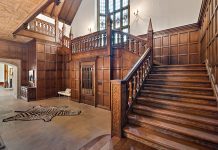 Via DBusiness.com
Via DBusiness.com
Real estate is all about price, available financing, and confidence. If one of those components is absent, the market will stagnate or fall. Such has been the state of Michigan’s real-estate industry over the last three years, and now the rest of the nation is in the same boat.
The run-up to the struggling market for homes, office buildings, industrial parks, and, to a lesser extent, retail, has been covered extensively. Lax oversight, overzealous speculation, and downright greed have been at the core of the problem. The result was an abundance of bad loans and foreclosures, which roared through Wall Street and the banking sector and led to the closing of investment houses, financial institutions, and mortgage companies.
Because so many residential foreclosures are on the books, it’s pulling down the value of owner-occupied homes. And the only way to forge a recovery is to sell off the foreclosed homes, which will stabilize the market and eventually bring about a recovery. “Right now, on average, a foreclosed home is selling for $70 a square foot, while owner-occupied homes are at $100 a square foot,” says Paul Robertson, president of Robertson Brothers Group in Bloomfield Hills. “We need to get through that foreclosure inventory before the market will begin to recover.”
Because Michigan had a head start on the foreclosure crisis, it’s in better shape than other states such as California, Arizona, Nevada, and Florida. Robertson estimates Michigan has sold half of its inventory of foreclosed homes, while the other states are just getting started. Once that Michigan batch gets depleted, Robertson says, the market will recover.
Robertson, who develops lots, builds homes, and now acts as a consultant to banks and developers, has witnessed the carnage firsthand. Four years ago, his company recorded $60 million in annual revenue and had 75 employees. Last year, he posted $8 million in revenue and had 12 employees. “The reason we survived is [because of] our consulting business,” he says. “Forty percent of our business today is selling our own projects; the rest is selling for someone else.”
That “someone else” is banks and financial institutions that have scores of foreclosed properties on their books, with limited staff to maintain and resell them. It also includes other real-estate projects such as the Riverfront Condominiums (formerly Riverfront Apartments) in Detroit.
Since Robertson and his wife, Jan, began overseeing sales at Riverfront last spring, they’ve sold 33 units. That’s in the worst market for residential real estate since the Great Depression. “We just repositioned the property, cut prices to reflect the current market, and made the sales,” Robertson says. “It wasn’t easy, but we found the buyers.”
He’s achieved similar success with other projects such as The Ellington, a 55-unit condominium project at Woodward and Mack in Detroit, as well as with several projects in the suburbs. Buoyed by the sales, Robertson believes the market will start to show signs of a recovery next year. Let’s hope he’s right.
|
|
|









